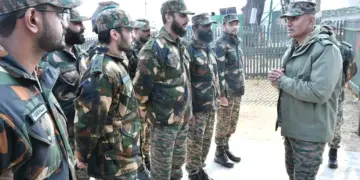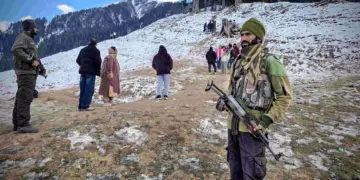Srinagar/New Delhi: Chief Minister Omar Abdullah on Monday said people of Jammu and Kashmir have been patient with their demand for restoration of statehood but the Centre should not take advantage of it.
Abdullah warned that it does not take long for the situation to change.
“It does not take long for the situation to turn worse. And we do not want that there should be bloodshed of innocent people here again. We will continue to put forth our demands in a peaceful manner,” he said.
“People have been very patient so far (about restoration of statehood) but it should not be taken advantage of,” Abdullah told reporters in Ganderbal district.
The CM said restoration of statehood to Jammu and Kashmir was not a favour but a promise made to the people.
“Statehood is not a favour. It is a promise made by the Government of India with not only people of Jammu and Kashmir but also the Supreme Court.
“They repeatedly told the supreme court that it will be a three step process — delimitation, elections and statehood. First two steps have been taken and it is now time to fulfill the promise of statehood,” he added.
On the situation in Ladakh, Abdullah said his party had warned the people about the possible fallout of being a union territory much before the cold desert region was granted that status.
“As far as people of Ladakh are concerned, we had warned them much before they were granted UT status that they be careful with their demand for union territory as it may not be beneficial for them. They got the UT status and instead of benefitting from it, they have faced losses,” he said.
Meanwhile, at a function in Delhi, Omar Abdullah accused the Centre of betraying both Ladakh and J&K by failing to fulfill its promises and deepening mistrust through delays in restoring statehood.
Speaking at the launch of senior journalist and author Harinder Baweja’s latest book, “They Will Shoot You, Madam: My life through conflict” on Sunday, Abdullah said the government had failed to follow through on its own roadmap, first for Jammu and Kashmir and now for Ladakh, alleging that the latter was misled with “impossible” assurances.
“When you wanted them (Ladakh) to participate in Hill Council elections, you promised them the Sixth Schedule. Everyone knew that giving the Sixth Schedule to Ladakh was nearly impossible. A region that shares frontiers with China on one side and Pakistan on the other requires a sizable defence presence, which the Sixth Schedule makes impossible. Yet, you made promises to get electoral participation,” he stated.
He also criticised the sudden shift in the stance towards Ladakhi leaders, especially climate activist Sonam Wangchuk.
“A gentleman who, until yesterday, was praising the prime minister as an environmental warrior and thanking him profusely for 2019 for fulfilling the dreams of Ladakhis by giving UT status… nobody found fault with him then. Today, suddenly, we find a Pakistani connection. Two days ago, there was none. Where did it come from?” he asked.
The protests in support of the demand for statehood and inclusion of Ladakh in the Sixth Schedule of the Constitution took a violent turn on September 24, leaving four people dead and many injured.
Following the incident, Wangchuk, who had been among those leading the protest, was detained under the National Security Act (NSA).
On Jammu and Kashmir’s demand for restoring statehood, Abdullah accused the central government of failing to honour its own commitments.
“You told us it was a three-stage process — first delimitation, then elections, and finally statehood. The first two have been completed, but the third has gone nowhere. And then you wonder why there is a trust deficit,” he said.
Abdullah cautioned that the trust deficit was eroding public faith, despite the unprecedented participation of Jammu and Kashmir residents in recent polls — both Parliament and Assembly.
He also pointed to the recent Supreme Court remarks on statehood, where petitioners urging the Centre to fulfill its promise of restoring Jammu and Kashmir’s status were told to consider “ground realities” such as the Pahalgam terror attack.
Abdullah said it was “deeply distressing” that the matter seemed to be tied to events across the border, asking, “Does Pakistan now decide whether J&K should have statehood?”
“Because every time we come close to statehood, something like Pahalgam will happen and again, we will be sent back,” he said, asserting that statehood cannot be used as a “carrot” for good behaviour.
Stressing that the issue is not about Kashmir — the land — but about “Kashmiri” — the people — Abdullah said the people want to feel a genuine sense of ownership again.
“We make that small difference in the nomenclature, and you make a huge difference on the land… And they (the people) have shown it to you time and again over the last two years, three years. They want to be owned, they want to be listened to, they want to be respected,” he said.
The panel discussion was also joined by former Punjab chief minister Captain Amarinder Singh.
“They Will Shoot You, Madam”, published by Roli Books, charts Baweja’s journey of venturing deep into conflict zones, bringing to light stories from difficult terrains — from the bloodied streets of Punjab to the volatile battleground of Jammu and Kashmir, and onwards to Pakistan and ravaged Afghanistan.








